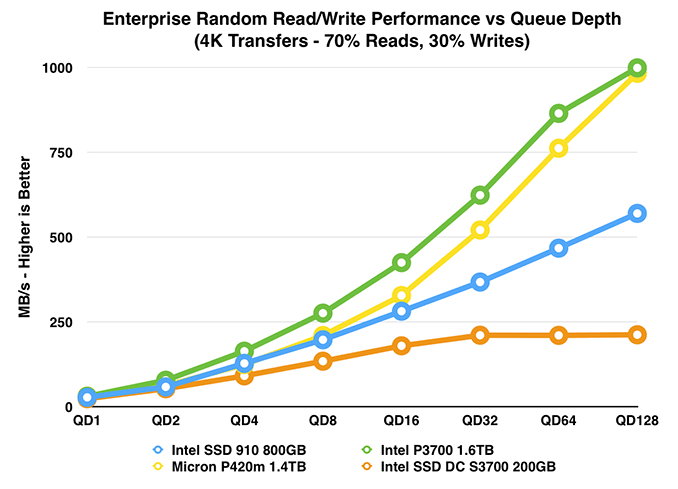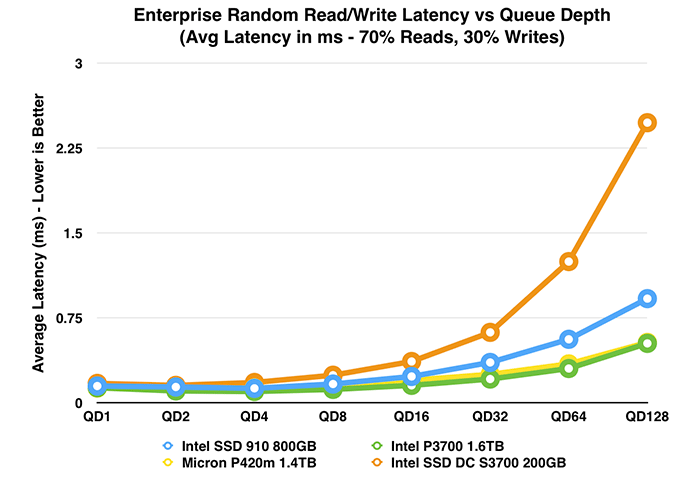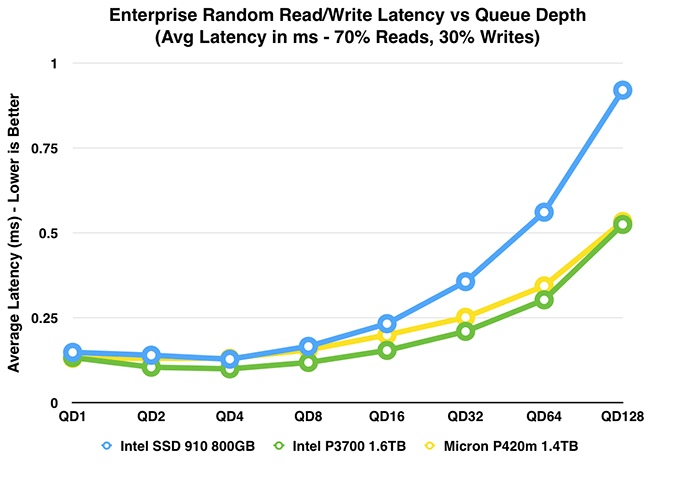Intel SSD DC P3700 Review: The PCIe SSD Transition Begins with NVMe
by Anand Lal Shimpi on June 3, 2014 2:00 AM EST- Posted in
- Storage
- SSDs
- Intel
- Intel SSD DC P3700
- NVMe
Mixed Read/Write Performance
Although our four corner testing is useful, many real world enterprise workloads are composed of a mixture of reads and writes. OLTP environments in particular tend to see a 70/30 split between reads and writes. The test below is conducted the same way as our 4KB random write test (1 sequential drive write, 1 4K-QD128 random drive write, then 3 minute test), but the actual test is 70% reads and 30% writes.

The results here look a lot like the 4KB random read results, but with a slightly different slope. The P3700 and Micron's P420m compete for top billing, but the P3700's superior random write performance and solid midrange queue depth random read performance ultimately give it the edge here.












85 Comments
View All Comments
extide - Tuesday, June 3, 2014 - link
They finally did it, a bad ass no-compromises SSD.extide - Tuesday, June 3, 2014 - link
Dissappointed you didnt run the 2013 Destroyer on there, with that amazing low-queue depth performance, it will probably blow everything else away on that chart.smartypnt4 - Tuesday, June 3, 2014 - link
I mean really... For $1.50/GB, this could be purchased by a desktop enthusiast, so it's completely valid to test this against other consumer drives to see how it'd do. I'd be very interested in the results.B3an - Tuesday, June 3, 2014 - link
I agree, needs consumer drive comparisons...edward1987 - Tuesday, February 7, 2017 - link
I found some better use for this pcie ssd drive. You can use it in qnap TVS-1282 or TDS-16489U for hot data. They do tiered storage functionality. Its £600 to get this ssd, but if you want VMs this is great. (https://www.span.com/product/Intel-SSD-DC-P3700-PC...TelstarTOS - Tuesday, June 3, 2014 - link
absolutely, but wait until they have a 3600 or 3500 in their hands.NCM - Tuesday, June 3, 2014 - link
It would also be useful to compare to the PCIe consumer SSD's that Apple has been shipping in the MacBook Pro, MacBook Air and iMac lines for quite some time now. Given its sales volume and early adoption of PCIe drives, I'd have to imagine that Apple may have shipped more of them to users than anyone else. (These drives are supplied by both Samsung and SanDisk, and perhaps others.)Yes this new Intel product is for a quite different market, but comparison is how one comes to understand what those differences are and mean.
Marthisdil - Tuesday, June 3, 2014 - link
No one really cares much about Apple's offerings. Mainly because they are such a small percentage of the Marketplace....easp - Monday, June 9, 2014 - link
You miss the point. They are one of the largest players in the consumer market. Moreover, most of their sales are a premium price points and include SSDs. Put the two together, and they almost certainly ship more consumer SSDs than any one else by far. What's more, many of their lines are already on PCIe SSDs.So, please explain why Apple's shipping PCIe SSD options aren't a significant point of comparison against an aftermarket SSD that just arrived in the market.
SeanJ76 - Wednesday, May 20, 2015 - link
Casue Apple is shit!